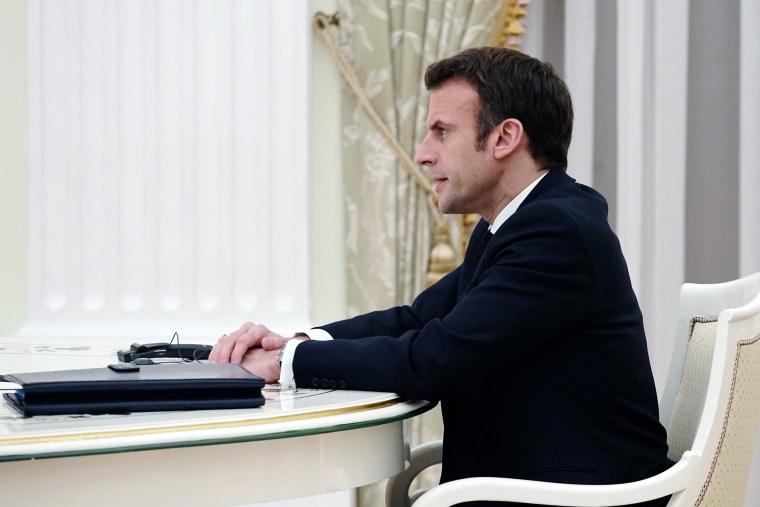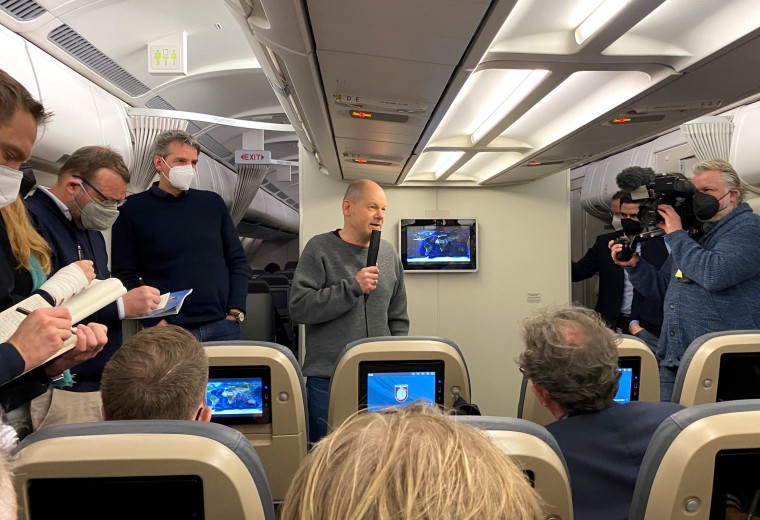Entering a critical week in the standoff over Ukraine, neither Russia nor the United States sounded optimistic about intensifying diplomatic efforts to de-escalate tensions.
President Joe Biden warned Monday that Americans who are not U.S. government employees should leave Ukraine. “I’d hate to see them get caught in a crossfire,” he said.
At the same time, Biden said the U.S. is unsure of Russian President Vladimir Putin's next move.
"What he’s going to do, I don’t know. And I don’t think anybody knows but him," Biden said, following a meeting at the White House with the new chancellor of Germany, Olaf Scholz.
Biden’s comments came a day after White House national security adviser Jake Sullivan said on NBC News' "Meet the Press" that “an invasion of Ukraine could happen at any time.”
The U.S. and its allies have been sounding the alarm for weeks, with Russia massing more than 100,000 troops near Ukraine’s borders and issuing a set of bold demands that were largely dismissed.
But fears that Europe is standing on the precipice of a deadly new conflict have also prompted a flurry of diplomacy. French President Emmanuel Macron flew to Moscow on Monday for a high-stakes face-to-face meeting with Putin, while Scholz met with Biden at the White House. Macron will head to Kyiv on Tuesday, while Scholz is set to travel to both Russia and Ukraine next week.
Macron called for de-escalation as he sat down for talks with Putin in the Kremlin.

“Dialogue is necessary because that’s the only thing that will help, in my views, to build a context of a security and stability on the European continent,” Macron said, calling the discussion a possible first step toward de-escalation.
“I’m happy to have this opportunity to have a deep discussion on all these issues ... and to start building an effective response,” he added.
Putin, in turn, hailed France’s role in shaping European security and noted that their talks came on a day when the countries signed a friendship treaty 30 years ago.
“I realize that we share concern about what’s going on in Europe in the security sphere,” Putin told Macron, adding that he appreciates his efforts to help ensure “an equal security in Europe” and broker a settlement to the Ukrainian crisis.
Germany's Scholz, meanwhile, has resisted pressure to deliver arms to Ukraine and urged “prudence” on potential economic measures against Moscow, raising fears that Berlin may be a weak link in the West's effort to present a united front in the crisis.
Scholz and Biden sought to appear unified after their meeting Monday, telling reporters at a joint press conference that the U.S.-Germany alliance remained strong and that the two countries would work with other allies to prepare for the possibility of a Russian invasion.
"It is important that we act together, that we stand together and that we do what is necessary together," Scholz said, speaking through a translator. "We made it very clear if there was a military aggression against Ukraine, this will entail severe consequences that we agreed upon together."
The two leaders, however, did not appear on the same page regarding the fate of the controversial Nord Stream 2 pipeline if Russia were to invade.

'Tense atmosphere'
Macron said in an interview with the French newspaper Journal du Dimanche that he wasn’t expecting a major breakthrough from his trip to Moscow but that it was essential to meet with Putin nonetheless.
“It is indispensable to prevent a degradation of the situation before building confidence gestures and mechanisms,” he said. “The geopolitical objective of Russia today is clearly not Ukraine, but to clarify the rules of cohabitation with NATO and the E.U.”
Macron spent the weekend coordinating with allies on the phone, including Biden, with whom he spoke on Sunday.
Russia appeared to agree that his efforts were unlikely to yield immediate results.
“The situation now is too complicated to expect decisive changes after one meeting,” Kremlin spokesman Dmitry Peskov said at a press briefing Monday.
“A very, very tense atmosphere remains,” he said, blaming Western leaders for ignoring Russian demands. "Instead, they prefer to discuss in a very exalted manner the problem of, as they see it, Russia’s impending attack on Ukraine."
Moscow has repeatedly denied that it is planning such an attack, but has already assembled 70 percent of the forces it would need to launch a full-scale invasion of Ukraine, according to a U.S. official with direct knowledge of the latest government assessment. Were that to happen, the Ukrainian capital, Kyiv, would most likely be captured in the early days of the invasion, possibly within the first 48 hours, the official said.
The rate at which troops and equipment are arriving at the border means Russia may be at full capacity to invade by Feb. 15, when the ground is expected to be optimally frozen for tracked vehicle movement through to the end of March.
It was unclear how the government arrived at the estimates; NBC News has not seen supporting documents.
Russia however, has decried the estimates as propaganda.
“Another masterpiece of U.S. propaganda war,” tweeted Dmitry Polyanskiy, Russia’s deputy ambassador to the United Nations, on Sunday. “Unnamed officials, undisclosed sources, no evidence.”
European energy
Secretary of State Antony Blinken on Monday discussed U.S. efforts to defend Europe and Ukraine against Russian aggression, including a goal to shore up the energy supply of allies as the Kremlin holds back natural gas supplies from Europe.
“President Biden’s pledged the United States will do everything we can to help ease any disruptions to Europe’s energy supply,” Blinken said at a U.S.-European Union ministerial meeting at the State Department, adding that Ukraine’s energy grid is “now ready” to connect to Europe.
At a news conference Monday with the E.U.'s foreign policy chief, Josep Borrell, Blinken said the U.S. is talking with governments and major energy producers around the world about increasing their production and distribution capacity. He said the administration is also coordinating with allies and the energy sector about "how best to share energy reserves in the event that Russia turns off the spigot or initiates a conflict that disrupts the flow of gas through Ukraine."
Blinken said the U.S. doesn't believe Putin has made a decision yet about whether to invade Ukraine, but has the capacity to do so if he decides to act.
The Biden administration has "developed a high-impact, quick-action response that would inflict massive costs on the Russian economy and financial system, including sanctions and significant export controls that would have a long-term effect in denying Russia the technology that it needs in key sectors, and we’re working closely with the E.U. as they prepare complementary actions," Blinken said.
The increasing sense of urgency from the West comes after Putin said last week that the U.S. and its allies have ignored Russia's key demands in the standoff.
In a series of bold security demands, the Kremlin urged NATO to deny membership to Ukraine and other ex-Soviet countries and to roll back its military deployments in Central and Eastern Europe, claiming NATO expansion poses a serious threat to Russia.
They were largely rejected, but there has been a persistent hope that there may nonetheless be a diplomatic route out of the crisis.
